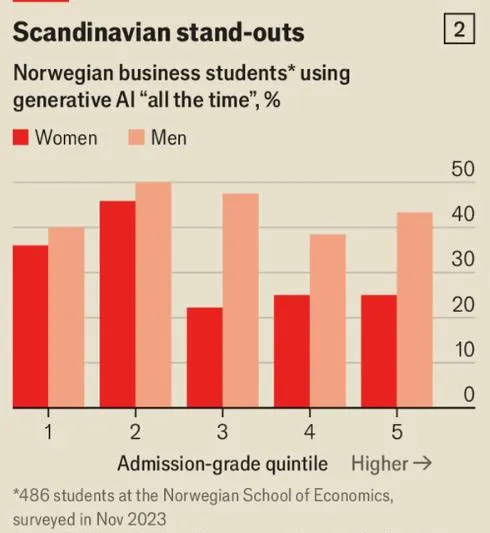原文標題:
The new gender gap
Why don’t women use artificial intelligence?
Even when in the same jobs, men are much more likely to turn to the tech
新的性別差異
為什麽女人不使用人工智慧?
即使在相同的工作崗位上,男性也更有可能求助於AI技術
[Paragraph 1]
BE MORE PRODUCTIVE. That is how ChatGPT, a generative-artificial-intelligence tool from OpenAI, sells itself to workers.
「讓工作更高效」,這是OpenAI的生成式人工智慧工具ChatGPT向職場人士宣傳的賣點。
But despite industry hopes that the technology will boost productivity across the workforce, not everyone is
on board
.
但是,盡管業界期望AI技術能夠提高整個勞動力市場的生產效率,但並非所有人都認同這一點。
According
to two recent studies, women use ChatGPT between 16 and 20 percentage
points less than their male peers, even when they are employed in the
same jobs or read the same subject.
根據最近的兩項研究,即便是在從事相同工作或學習相同主題的情況下,女性使用ChatGPT的比例也比男性同行低16-20個百分點。

[Paragraph 2]
The first study, published as a working paper in June, explores ChatGPT at work.
第一份相關的研究報告
釋出於6月,以工作檔的形式探討了ChatGPT在工作場景中的套用。
Anders
Humlum of the University of Chicago and Emilie Vestergaard of the
University of Copenhagen surveyed 100,000 Danes across 11 professions in
which the technology could save workers time, including journalism,
software-developing and teaching.
芝加哥大學的安德斯·胡姆倫和哥本哈根大學的埃米莉·維斯特加德對丹麥11個行業的10萬名從業者進行了調查,這些行業包括新聞、軟體開發和教學等,AI技術都有可能為這些從業人員節省時間。
The researchers asked respondents how often they turned to ChatGPT and what might keep them from adopting it.
研究人員詢問了受訪者使用ChatGPT的頻率,以及可能阻礙他們采用ChatGPT的因素。
By exploiting Denmark’s extensive,
hooked-up
record-keeping, they were able to connect the answers with personal information, including income, wealth and education level.
他們利用丹麥詳盡的聯網記錄系統,將受訪者的回答與他們的個人資訊(如收入、財富和教育程度)進行了關聯分析。

[Paragraph 3]
Across all professions, women were less likely to use ChatGPT than men who worked in the same industry (see chart 1).
在所有行業中,與從事同一行業的男性相比,女性使用ChatGPT的可能性更低(見圖表1)。
For example, only a third of female teachers used it for work, compared with half of male teachers.
例如,只有1/3的女教師會在工作中使用ChatGPT,而男教師則有1/2使用。
Among software developers, almost two-thirds of men used it while less than half of women did.
在軟體開發領域,近2/3的男性使用ChatGPT,而女性則不到1/2。
The
gap shrank only slightly, to 16 percentage points, when directly
comparing people in the same firms working on similar tasks.
當直接比較在同一家公司從事相似工作的員工時,這一差距僅略微縮小至16個百分點。
As
such, the study concludes that a lack of female confidence may be in
part to blame: women who did not use AI were more likely than men to
highlight that they needed training to use the technology.
因此,這項研究得出結論,女性缺乏自信可能是造成這種差異的原因之一:與男性相比,不使用AI技術的女性更可能認為她們需要接受培訓才能掌握這項技術。
[Paragraph 4]
Another
potential explanation for the gender imbalance comes from a survey of
486 students by Daniel Carvajal at Aalto University and Catalina Franco
and Siri Isaksson at the Norwegian School of Economics (NHH).
艾爾托大學的丹尼爾·卡瓦哈爾以及挪威經濟學院(NHH)的卡塔利娜·法蘭科和西麗·伊薩克森對486名學生進行了另一項調查,也揭示了性別差異的潛在原因。
It
also found a gender gap: female students enrolled in the NHH’s only
undergraduate programme were 18 percentage points less likely to use
ChatGPT often.
這項調查同樣發現了性別差異:NHH唯一本科課程中的女生經常使用ChatGPT的可能性比男生低18個百分點。
When
the researchers separated students by admission grades, it became clear
that the gap reflected the behaviour of mid- and high-performing women
(see chart 2).
當研究人員按照入學成績將學生分組時,差距變得更加明顯,這反映了中等成績和好成績女生的行為(見圖表2)。
Low performers were almost as likely as men to use the technology.
成績較差的女生使用AI技術的可能性則與男生相近。

[Paragraph 5]
Why might this be? The researchers
probed
what was going on with some clever follow-up questions.
為什麽會這樣?研究人員透過一些巧妙的後續問題探究了背後的原因。
They
asked students whether they would use ChatGPT if their professor
forbade it, and received a similar distribution of answers.
他們詢問學生,如果教授禁止使用ChatGPT,他們是否還會使用,得到的回答分布相似。
However, in the context of
explicit
approval, everyone, including the better-performing women, reported that they would make use of the technology.
然而,在明確允許使用ChatGPT的情況下,所有人都表示他們會使用這項技術,也包括成績好的女生。
In other words, the high-achieving women appeared to
impose
a ban on themselves.
換句話說,成績好的女生似乎是在自我設限。
「It’s
the ‘good girl’ thing,」 reckons Ms Isaksson. 「It’s this idea that ‘I
have to go through this pain, I have to do it on my own and I shouldn’t
cheat and take short-cuts’.」
伊薩克森女士分析道:「這是‘乖乖女’的心態在作祟,她們認為‘我必須經歷這種痛苦,我必須自己完成,我不應該作弊和走捷徑’。」
[Paragraph 6]
A lack of experience with AI could carry a cost when students enter the labour market.
當學生進入勞動力市場時,缺乏AI經驗可能會付出代價。
In
August the researchers added a survey of 1,143 hiring managers to their
study, revealing that managers value high-performing women with AI
expertise 8% more than those without.
今年8月,研究人員在研究中又增加了一項對1143名招聘經理的調查,結果顯示,這些經理對具備AI專長又成績好的女生的評價比對沒有AI專長的女生高出8%。
This
sort of premium does not exist for men, suggesting that there are
rewards for women who are willing to relax their self-imposed ban.
這種溢價在男性中並不存在,這表明那些願意放寬自我限制的女性將會得到相應的報酬。
[Paragraph 7]
Tera Allas of McKinsey, a consultancy, worries that by the time AI is firmly
embedded
into modern working life, it might be designed to appeal more to men,
who are its main users—potentially shutting women out in the long term.
麥肯錫咨詢公司的特拉·阿拉斯擔心,等到人工智慧深深融入現代職場生活時,它可能會為了迎合其主要使用者——男性而設計,長期來看這可能會將女性拒之門外。
But
not everyone is as concerned. Despite the fact that the early internet
was dominated by men, for example, young American women were more online
than their male counterparts by 2005.
然而,並非所有人都如此擔憂。例如,盡管早期互聯網以男性為主,但到了2005年,美國年輕女性的上網時間就已經超過了同齡男性。
On top of
this,
Danielle Li of the Massachusetts Institute of Technology notes that the
studies do not actually show whether men’s current ChatGPT use
translates into better or more productive work.
此外,麻省理工學院的丹尼爾·李指出,這些研究並沒有真正表明男性目前使用ChatGPT是否意味著更好或更高效的工作。
At
the moment, the technology may be more of a digital toy, she says.
Perhaps, then, high-achieving women are simply better at avoiding
distraction.
她說,目前這項技術可能更像是一種數位玩具。也許,成績好的女生只是更善於避免分心。
(恭喜讀完,本篇英語詞匯662左右)
原文出自:2024年8月24日【TE】Finance & economics版塊
精讀筆記來源於:自由英語之路
本文轉譯整理: Irene
本文編輯校對: Irene
僅供個人英語學習交流使用。
As
such, the study concludes that a lack of female confidence may be in
part to blame: women who did not use AI were more likely than men to
highlight that they needed training to use the technology.
因此,這項研究得出結論,女性缺乏自信可能是造成這種差異的原因之一:與男性相比,不使用AI技術的女性更可能認為她們需要接受培訓才能掌握這項技術。
Low performers were almost as likely as men to use the technology.
成績較差的女生使用AI技術的可能性則與男生相近。
In other words, the high-achieving women appeared to impose a ban on themselves.
換句話說,成績好的女生似乎是在自我設限。#深度好文計劃#

自由英語之路











